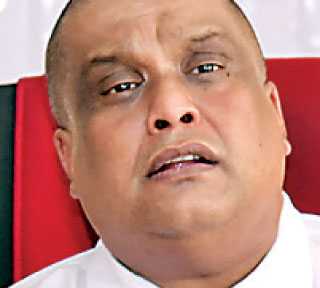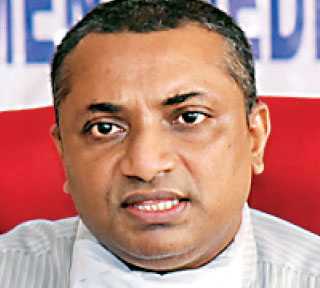Friday Feb 20, 2026
Friday Feb 20, 2026
Thursday, 16 July 2020 02:36 - - {{hitsCtrl.values.hits}}
By Shailendree Wickrama Adittiya
 |
| GMOF President Dr. M. R. E. Bellana |
 |
| GMOF Media Secretary Dr. Niroshana Premarathna
|
The Government Medical Officers Forum (GMOF) yesterday called on the Government to consult with other medical associations besides the Government Medical Officers’ Association (GMOA) on matters relating to COVID-19.
Addressing the press yesterday, GMOF Chairman Dr. Rukshan Bellana questioned why the Sri Lanka Medical Association (SLMC) and Association of Medical Specialists are not included in discussions related to COVID-19, stating that it was the Government’s responsibility to include these organisations in discussions.
Pix by Ruwan Walpola
“The Health Minister meets with the GMOA morning and night, while organisations by medical specialists keep requesting meetings, but do not get the opportunity to do so for months. In the last seven months, the Minister has met the medical specialists maybe one time,” he said.
He explained that there are a lot of inaccuracies regarding COVID-19, even by the World Health Organisation (WHO), but that, “Nobody should talk like a smart aleck and say, ‘I know the law’.” Dr. Bellana explained that the GMOA was doing this, but that they should put a stop to it because they are a trade union and not a professional academic body.
While stating that he believes the Government and Health authorities have done well in containing the spread of COVID-19 in the country, Dr. Bellana went on to say, “What I say is that you must not talk about COVID-19 as a trade union in respect of its technical and scientific matters, but you can criticise the Government, Health authorities, and others for not doing enough for the system.”
He explained that the GMOA has collected Rs. 1 billion from members, and that this was not to talk about COVID-19, but to draw attention to a lack of facilities GMOA members are faced with. The GMOF also claimed that Sri Lanka faced a Rs. 900 billion loss during curfew, and this, along with financial difficulties faced by the public, was a result of the actions of the GMOA.
“The GMOA called for lockdown on 20 March, which continued until June. Reports show that this caused a Rs. 900 billion loss to the country, which is three times the annual budget allocation to the health sector. Who is responsible for this?” Dr. Bellana retorted.
GMOF Secretary Dr. Niroshana Premaratne placed responsibility on the GMOA, and stated that the organisation is only vocal about COVID-19-related matters when it could be of benefit to them. The GMOA was silent in January, Dr. Premaratne said, adding, “In March, they suddenly became vocal because they thought the GMOA Chairman will receive the Secretary post at the Health Ministry.”
He went on to say that since this did not happen, the GMOA criticised the Government for not going into lockdown. “When we had 28 COVID-19 patients, the GMOA called for lockdown, because they thought it would get them nominations through the Sri Lanka Podujana Peramuna (SLPP).”
The GMOF also criticised the GMOA’s recommendations to prevent a second wave of COVID-19 in the country. While they claimed that the country has had clusters and pockets but not waves, the GMOF said the GMOA’s call for increased PCR testing was a money-making venture.
“As a country, we do not have the financial capacity for a large amount of PCR testing. Wealthier countries have done testing in a large scale, but what are the countries that have been more successful than us? Considering their spending, their success rates are low,” Dr. Premaratne said, adding that COVID-19 cannot be prevented by carrying out PCR tests.
According to them, this was due to the fact that of a hundred patients, only 60% to 65% will be identified by the PCR test, while 30% of persons with COVID-19 will be excluded. The GMOF questioned why the GMOA was calling for increased PCR testing, when they could instead be calling for the use of the low-cost drug dexamethasone.
The World Health Organisation last month stated, “According to preliminary findings shared with WHO (and now available as a preprint), for patients on ventilators, the treatment was shown to reduce mortality by about one-third, and for patients requiring only oxygen, mortality was cut by about one fifth.”
The GMOF also spoke about the importance of preventing the spread of COVID-19, saying that face masks and shields as well as hand hygiene and other health practices were vital. They added that these measures were more important than physical distancing, if the virus spreads through air.